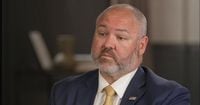In a dramatic turn of events, the acting commissioner of the Internal Revenue Service (IRS) has been replaced just days after taking the position, amid allegations of behind-the-scenes maneuvering by billionaire Elon Musk. On April 18, 2025, Gary Shapley was ousted from his role as the interim head of the IRS after Treasury Secretary Scott Bessent reportedly complained to President Donald Trump that Shapley had been installed without his knowledge and at Musk's behest.
Shapley, who had been appointed only two days prior on April 15, was seen as a controversial choice, particularly due to his vocal criticisms of the Justice Department's handling of the Hunter Biden tax investigation. His appointment came after the previous acting commissioner, Melanie Krause, resigned over a contentious data-sharing agreement between the IRS and Immigration and Customs Enforcement (ICE) that would facilitate the deportation of undocumented immigrants.
According to sources familiar with the situation, Bessent believed Musk had circumvented him to secure Shapley's appointment. Musk's Department of Government Efficiency allegedly pushed the appointment through White House channels, leading to Bessent's concerns about a lack of consultation in the decision-making process. Bessent ultimately sought Trump's approval to reverse Shapley's appointment, a move that highlights the ongoing tensions within the Trump administration regarding IRS leadership.
Following Shapley's removal, Deputy Treasury Secretary Michael Faulkender is expected to step in as the next acting head of the IRS until former Congressman Billy Long is confirmed for the permanent position. Long's confirmation hearing has yet to be scheduled, leaving the IRS in a state of uncertainty.
The tumult surrounding Shapley's brief tenure was compounded by a public feud between Musk and Bessent that erupted on social media. Late on April 17, Musk amplified criticism from far-right activist Laura Loomer, who accused Bessent of being involved with individuals opposed to Trump. Musk described the situation as “troubling” in a post on X, the social media platform he owns.
In his short time as IRS commissioner, Shapley faced immediate challenges, including the fallout from his predecessor's resignation. Krause's departure followed her agreement with the Treasury Department to share IRS data with ICE, raising concerns about privacy and the politicization of the agency. This agreement had already sparked significant backlash, making Shapley's appointment a contentious issue from the start.
Shapley, who had spent 14 years at the IRS, gained notoriety for publicly alleging that the investigation into Hunter Biden's taxes had been hindered by political pressures. His outspoken nature made him a polarizing figure, especially among those who viewed his appointment as a potential attempt to influence IRS operations for political ends.
In a statement addressing the situation, White House Press Secretary Karoline Leavitt did not delve into the specifics of the dispute but emphasized that disagreements are commonplace within the administration. “It’s no secret President Trump has put together a team of people who are incredibly passionate about the issues impacting our country,” she stated, reinforcing the notion that such conflicts are part of the policy-making process.
The IRS has been under scrutiny not only for its internal struggles but also for its role in broader political issues. Under Trump's administration, there have been calls to revoke the tax-exempt status of certain institutions, including Harvard University, which has raised alarms among current and former IRS officials about the potential for politicization of the agency.
As the situation continues to unfold, the IRS remains in a precarious position, having experienced a series of leadership changes that have left the agency without stable direction. Shapley was reportedly working from the IRS commissioner’s office on the morning of April 18, but his future within the agency remains uncertain as the administration seeks to navigate the fallout from this latest upheaval.
Moreover, Musk's involvement in the administration has drawn criticism from various quarters, with some arguing that his influence may be undermining the integrity of federal institutions. In recent weeks, Musk has publicly criticized other Trump advisers, including Peter Navarro, a prominent trade adviser, which has raised concerns about the internal dynamics of the administration.
As the Trump administration grapples with these challenges, the implications for the IRS and its operations could be significant. The agency has traditionally operated with a degree of independence, but ongoing political pressures may threaten its ability to function effectively and impartially.
In the wake of Shapley’s departure, the IRS faces not only leadership instability but also the potential for increased scrutiny regarding its actions and decisions. With the appointment of a new acting head, the agency will need to focus on rebuilding trust and ensuring that its operations are not unduly influenced by political considerations.
As the administration continues to evolve, the IRS will undoubtedly remain a focal point of political debate, particularly as it navigates the complexities of tax policy and enforcement in an increasingly polarized environment. The coming weeks will be crucial in determining how the agency adapts to these challenges and whether it can maintain its integrity amid external pressures.









